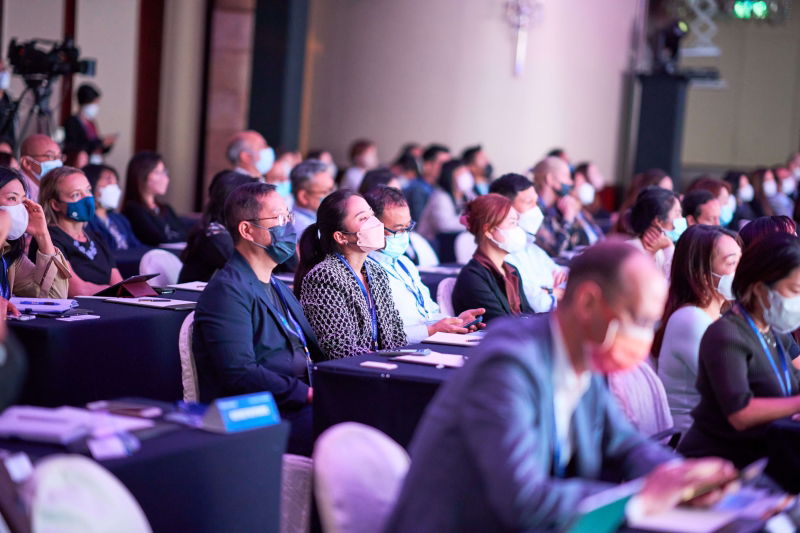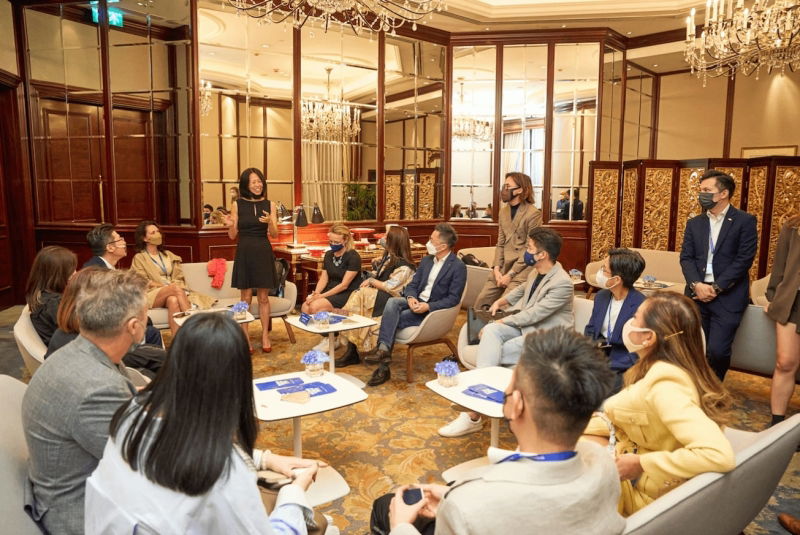
The Trade Desk powers CMO Summit 2022 with thought-provoking discussions
share on
The Trade Desk partnered with MARKETING-INTERACTIVE to power conversations around the changing forces impacting CMOs today. Titled “The CMO Summit 2022: The Future of Digital Marketing”, the event was held on 22 November 2022 at Island Shangri-la, and saw about 150 leading marketers from Hong Kong and the North Asian region in attendance.
Kicking off the event was Amanda Woolverton, head of marketing, North Asia, The Trade Desk, who welcomed our esteemed guests.
Shortly after, Jason Spencer, managing director of Kantar Hong Kong, shared key findings from Kantar’s CMO study based on 287 North Asia CMOs. One included how CMOs can strike a balance between short-term performance and sustainable branding in a post-pandemic recovery, including their growing need for integrated and omni-channel strategies, while another found that some CMOs are still unprepared for the demise of third-party data.
Tackling the topic of “marketers preparing for the future of privacy and identity”, Samantha Jacobson, chief strategy officer and executive vice-president of The Trade Desk, took the stage to share her thoughts on creating privacy-safe and secure communications channels, especially when it comes to the management of consumers’ data.
She outlined how emerging technology such as The Trade Desk’s Unified ID 2.0 will come in handy for marketers in identifying consumers. Moreover, having local representatives is vital.
“Having local expertise in each market has been a huge asset because as you’re thinking about consumer identity, it’s different by market, and is different based on what those different privacy laws are,” she said.

Building on the topic of “privacy opportunity for advertisers” was Frederic Jouve, managing director of APAC at LiveRamp. He emphasised that first-party data is a valuable asset for marketers to build relationships with consumers. At the same time, in a privacy-focused world, consumers have serious concerns about the organisations they share their data with, and how the data is being handled.
We then moved on to a panel discussion on Privacy 2.0. The panel saw Benson Ho, senior vice-president, North Asia, The Trade Desk, sharing that with the help of Unified ID 2.0 technology, marketers can take control of the privacy protection and build consumer trust in a more transparent and secure ecosystem.
Kei Majima, general manager, Japan, The Trade Desk, shared the Unified ID 2.0 technology is also totally compliant with the newly amended Personal Information Act in many major markets such as Japan, hence, marketers are in good hands if they use the solution to interact with consumers.
With consumers now living amid multiple devices, and scattered journeys, measurement is always a key part of success. Adrian Tan, senior vice-president and head of digital acquisition and martech at DBS Bank Hong Kong, highlighted the importance of comparison to set a benchmark for marketers, which echoes the CMO Study findings.

After the networking break was a presentation on the role of “brand building in a data-centric world” by Simon Morgan, vice-president of client development, APAC, The Trade Desk. He shared his thoughts on how to crack the customer code across multiple channels.
“I’d say to look at where your consumers are spending their time […] you now have tools and data to fully exploit the opportunities of the open internet,” he said.
The final panel discussion was centred on what it takes to build brands to increase revenue in the short and long term. Joshua Grant, director of analytics and innovative solutions at Dentsu, said certain companies look at the attentions or engagements drawn by their ad campaigns as one of their KPIs.
Meanwhile, Heidi Yao, director and head of marketing of IT and mobile at Samsung Electronics, said understanding the business needs is essential.
“We mapped out where are we purchasing, whether it is at the infant stage of digital maturity curve or we have to work in advance. What will be the first-year and second-year plan? What is needed in terms of the organisation, structure, process, and skills of the talent that we need to hire?”
Edward Bell, general manager of brand, insights and marketing communications at Cathay Pacific, added that ultimately, as marketers, the most responsible thing that can be done for the business is to invest in its own brand.
“That’s the best way to build sales because that contributes far more than the myriad of short-term commercial campaigns,” he said.
To round up the conversations, and direct us to the future, Chris Ngan, general manager of Hong Kong and Taiwan, The Trade Desk, pointed out there is a rise of connectivity as a majority of North Asia CMOs are going to invest in Connected TV (CTV) in the coming years.
“Marketers must realise the potential and power of CTV on brand building, which will help increase revenue in the short and long term. CTV is the art of the perfect combination of customer interaction, data utilisation and optimised entertainment experiences,” he said.
A consensus was reached at the Summit that the CMO plays a pivotal role in the transformation of digital marketing. Moreover, whoever helps the business to do more with less, brings long-term value to brands.
The event was then topped off with an exclusive roundtable dinner for guests where they were invited to share more insights on their views on privacy.
This article is done in collaboration with The Trade Desk.
share on
Free newsletter
Get the daily lowdown on Asia's top marketing stories.
We break down the big and messy topics of the day so you're updated on the most important developments in Asia's marketing development – for free.
subscribe now open in new window
